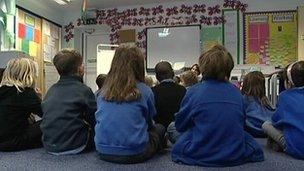Summer-born pupils 'should have exam scores boosted'
- Published
- comments

All school tests should be marked on a sliding scale according to pupils age, says the study
Summer-born children should have their exam marks boosted to compensate for being almost a year younger when they sit tests, a report argues.
In England, pupils born in August are less likely to get good GCSEs or go to university than those born in September, the Institute for Fiscal Studies says.
Some may even drop out of school.
The age-adjusted scores should be used to calculate school league table positions, the authors argue.
The report, external draws on an array of official data, including the National Pupil Database, which contains details of every pupil in England.
Report co-author Lorraine Dearden said: "In a world where everything was fair we would expect the proportion of kids by month of birth who get the expected level at each age to be the same."
But the report finds this is not the case, with a significant gap even at GCSE level. More than 60% of September-born pupils achieve five A* to C grades, compared with less than 54% of those born in August.
Report co-author Lorraine Dearden and Dame Sally Coates from The Burlington Danes Academy debate on BBC Radio 5 live
Mild special needs
August-born students are also around two percentage points less likely to go to university when they leave school, one percentage point less likely to attend a leading university and one percentage point less likely to complete a degree.
Some 12.5% of August-born pupils are assessed as having mild special educational needs by age 11, compared with only 7.1% of those born in September.
"Our research shows that children who are relatively young in their year have lower self-confidence, lower belief in their academic ability, and are more likely to start smoking younger than their relatively older peers," said co-author Claire Crawford.
The authors argue that being 11 months younger than the oldest pupils in the year when they sit tests is the main driver of the differences in test scores.
It outweighs the effect of having had less time at school in areas where summer-born children start education later in the year.
The report says the solution is to "age-adjust" national achievement test scores, arguing that this "is a simple and straightforward way of ensuring that those born towards the end of the academic year are not disadvantaged by taking the tests younger".
The team analysed scores from the Key Stage 2 tests, which are taken by all pupils in their final year of primary school in England. Primary school league table positions depend on pupils achieving an expected standard.
Sliding scale
They found that August-born pupils scored on average seven points less than classmates born in September.
They conclude that pass marks should rise for September-born children by three points: "So the oldest children would have to perform slightly better than they do at the moment in order to reach the expected level, which would now be an expected level for a given age rather than at a particular point in time."
The marks would change on a sliding scale, with the pass mark for children born in October and November rising by two points; for January and December-born children by one mark; staying the same for February and March children; and reducing by one point for those with April or May birthdays, by two points for those born in June or July, and by three points for those born in August.
The authors recommend that similar age-adjusted scores be extended to other school tests, from assessments of six-year-olds' reading skills to the crucial exams taken by 16-year-olds.
However, the authors acknowledge that the differences are most dramatic when children are first at school, and lessen as they grow older and the relative age gap reduces. There is no evidence that they persist into adulthood. So the exam results given to prospective employers should be absolute scores rather than age-adjusted, they concede.
'Intensive intervention'
Head teachers warned that tinkering with pass marks could have unintended consequences.
Brian Lightman, of the Association of School and College Leaders, said: "Telling summer-born children that they don't have to perform as well as their peers will do nothing to raise their self-esteem, confidence or achievement in later life.
"Employers need graduates who have reached a certain standard of education. Giving some students a grade which is adjusted downwards would lower their standard of achievement when it actually needs to be raised. This will have the opposite effect to what is intended."
Dame Sally Coates, head of Burlington Danes Academy in west London, told the Today programme on Radio 4 that she had not personally seen evidence of a birthday-related performance gap at secondary level.
She suggested that instead of tinkering with exams there should be "intensive intervention for younger children in early primary school".
Dame Sally said: "If you started having different exam grades for children born in different months, it would be extremely complicated. No one would understand it and there would be disputes."
Prof Rachel Brooks, of the University of Surrey, agreed early intervention could help prevent disparities in educational outcome.
She said: "The way in which pupils are grouped can have an effect - streaming tends to compound disadvantage, while summer-born children tend to do better within mixed-ability classes."
A Department for Education spokeswoman said: "We trust teachers to put their pupils' results into context when discussing them with parents, particularly for young children where age can have a strong influence on the scores.
"In addition, we have changed the schools admissions code to make it easier for parents to defer their child's entry until they reach their fifth birthday."
- Published27 February 2013
- Published1 November 2011